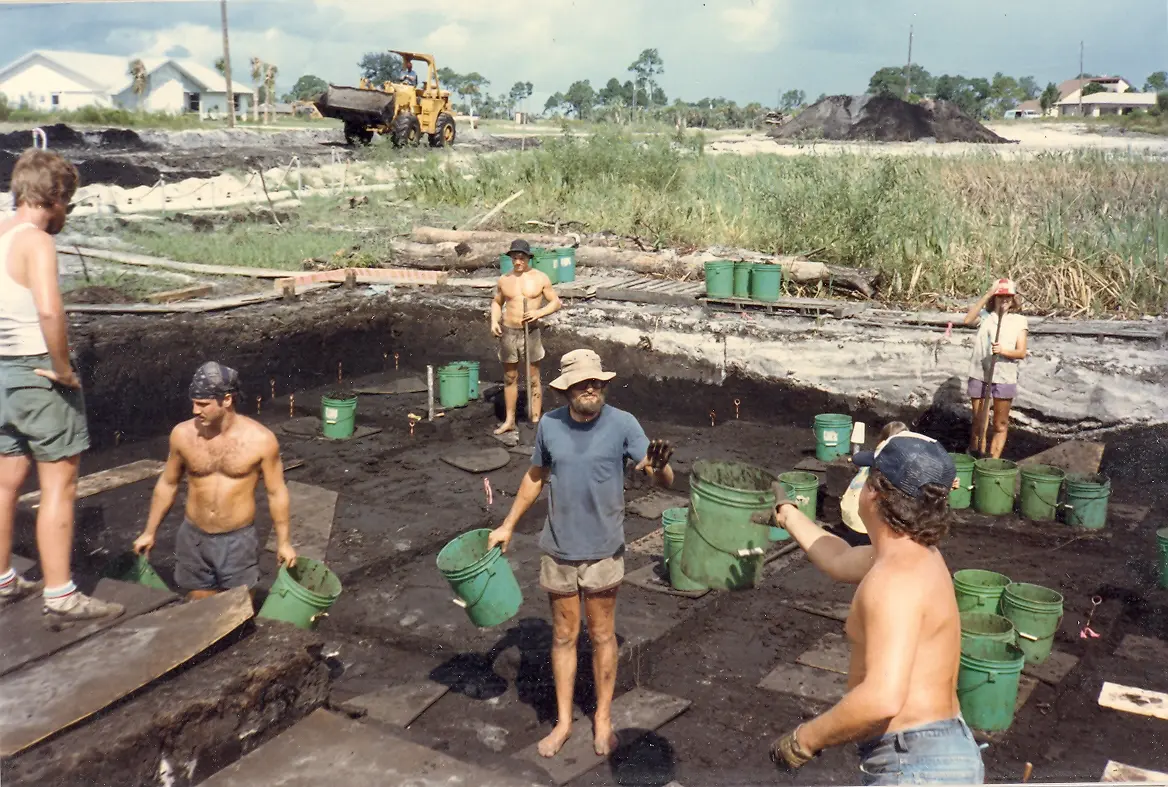People have lived in Florida for more than 10,000 years.
March is Florida Archaeology Month, and the 2015 theme is “Innovators of the Archaic.” The Archaic Period began about 9,500 years ago and continued until about 3,000 years ago.
Florida is rich with Archaic Period archaeological sites. Stone tools, pottery with distinctive regional styles, and prehistoric architectural foundations called shell middens have been discovered throughout the state. More than 100 dugout canoes, some dating to 5,000 years ago, have been excavated at Newnans Lake in Alachua County.
One of the most important Archaic Period archaeological excavations in the world happened in Brevard County. In 1982, as construction began on the Windover Farms neighborhood in Titusville, ancient human remains were uncovered. Archaeologists from Florida State University were called in to investigate.
“We arrived at the Windover construction site after five hours in the car from Tallahassee,” says Bruce Piatek, director of the Florida Historical Society Archaeological Institute and the Brevard Museum of History and Natural Science.
“Physical anthropologist Dr. Dailey, Archaeologist Dr. Doran and I, Dr. Doran’s graduate student, stepped out of the car by the construction trailer. The site superintendent set three five gallon buckets on his pickup truck tail gate and pulled out the first of six skulls. Dr. Daily examined the skull and while doing so we all heard something flopping around inside the cranium. Dr. Dailey flipped the skull over to look in the foramen magnum, then pulled out his pocket knife and removed a chunk of grayish stuff from inside the cranium. He rubbed it between his fingers, smelled it, and I think tasted it, then said ‘couldn’t be,’ and handed the skull to Dr. Doran.”
It was later determined that the “grayish stuff” was remarkably preserved brain matter that was more than 7,000 years old.
Nearly 200 complete sets of human remains were discovered at the Windover site, and 91 of the skulls contained intact brains. The bodies were ritualistically buried in the same position, wrapped in some of the oldest woven cloth ever found. The anaerobic environment of the pond cemetery allowed the ancient human remains and artifacts to be amazingly well-preserved.
Bruce Piatek, one of the first archaeologists to see the Windover remains, now runs the Brevard Museum in Cocoa where the story of the Windover People is told.
“We are the one place in the state where you can come and learn about this almost miraculous archaeological site,” says Piatek.
The Brevard Museum is holding activities for Florida Archaeology Month including public lectures from Sara Miller of the Florida Public Archaeology Network on Friday, March 6, and Annette Snapp from the Ah-Tah-Thi-Ki Seminole Museum on Friday, March 20.
A bus will depart from the museum on Wednesday, March 25, for a trip to St. Augustine to see the new Government House exhibit, the Castillo de San Marcos, and an active archaeological excavation. Lunch will be at the Columbia Restaurant.
A free “Archaeology Day” will be held on Sunday, March 8, from 1-4 pm on the museum grounds. Hands-on activities for people of all ages will be presented by FHSAI and FPAN.
“It’s an opportunity to work with the technology that these native peoples of Florida would have used,” says Kevin Gidusko, public archaeology coordinator for FPAN.
“We’ll have atlatls, a throwing stick that was utilized by the people of Florida to hunt. It was used much longer than bows and arrows, which are relatively recent. We’re going to have an opportunity for people to learn about prehistoric pottery through actively making some of their own the way native peoples did. They’ll also look at native plant technology through the types of seeds and types of plants that they would have grown.”
The Florida Historical Society Archaeological Institute, located at the Brevard Museum, is also celebrating its first anniversary this month. Over the past year FHSAI has published the book Searching Sand and Surf: The Origins of Archaeology in Florida, hosted an ongoing series of free public lectures, and actively participated in archeological research around the state.
“There’s a lot of interesting history,” says Piatek. “We’re helping to find more of it and document more of it, so we can build that story.”
Dr. Ben Brotemarkle is executive director of the Florida Historical Society and host of the radio program “Florida Frontiers,” broadcast locally on 90.7 WMFE Thursday evenings at 6:30 and Sunday afternoons at 4:00, and on 89.5 WFIT Sunday mornings at 7:00. The show can be heard online at myfloridahistory.org.
